Q&A: 2018 livestock award winners talk about the challenges ahead
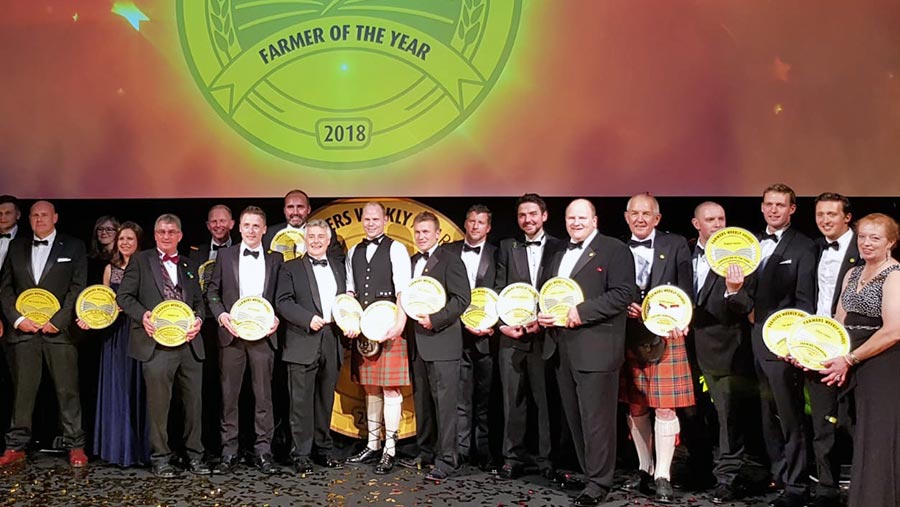
We asked our four 2018 livestock award winners how their businesses may change over the next 12 months with the Brexit deadline fast approaching.
We also how they would spend levy payers’ money if they were put in charge of AHDB, with each giving some very different and interesting answers.
Oh, and we threw in a few lighter-hearted ones to show that even award winners have bad days and make mistakes too!
See also: FW Awards 2018: Farming’s top night out in photos and videos
John and Sarah Yeomans, Sheep Farmer of the Year 2018, Llywn Y Brain, Newtown, Powys
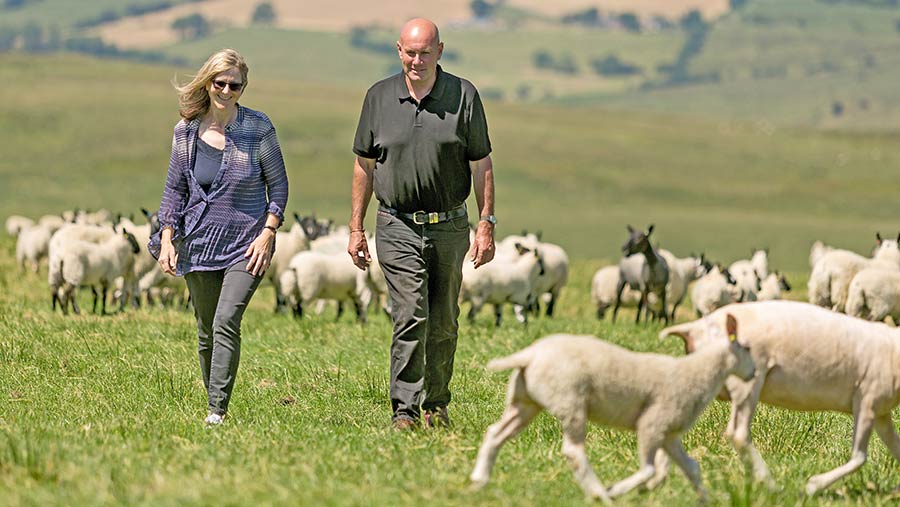
© Richard Stanton
Farm facts:
- 79 suckler cows
- 500 purebred Beulah ewes
- 115ha
What is the greatest challenge your business faces currently? And how are you planning on overcoming this?
Leaving the EU, (can’t say the ‘B’ word). It is difficult to prepare for something that no one knows the outcome of. Also TB (especially) and scab are constant worries. We run a closed herd and flock and many of our hedges are double-fenced but the movement of wildlife vectors is out of our control.
If you were head of AHDB what would you do with levy payers’ money?
Split spend up into the following areas: 25% research and development; 10% bringing in saleable primal meat yield objective-based carcass classification system into larger abattoirs; and 65% on promotion – 40% of that on increasing consumption in the UK in case we are subjected to WTO tariffs and 25% of it on overseas promotion and marketing.
What excites you about 2019?
We always look forward to lambing and calving to see how the new rams and bulls performed.
We are also planning a new project on the hill looking at increasing levels of a hardy and high-yielding Finnish timothy variety to try increase grass production and utilisation.
What advice would you give to your 18-year-old self?
Take every opportunity that comes your way. Talk to people; especially when things look grim, there’s always someone who is worse off and has come out of the other side stronger. You will get through it.
What do you think the opportunities are for your sector?
Increase consumption in the home market by working with retailers to promote our produce and work with schools and colleges to promote meat as part of a healthy diet.
If you could go and work in another country where would you go and why?
Sarah: Italy, because it’s warm, beautiful and I like the food!
John: China. Huge expansion in agriculture as they strive to produce for their massive population and the people are really kind and welcoming.
What’s your biggest bugbear about your peers/industry?
Sadly many in our industry seem to only see negatives. This can rub off on those they meet. Of course there are downsides in farming, but overall it’s a great industry with opportunities, and real rewards and fulfilment for those involved. We are proud to be part of it.
What was your last farming mistake?
A major one recently was going over a bumpy field while setting our new GPS fertiliser spreader.
I thought it looked like the fertiliser was coming out a tad on the thick side. I must have pressed an extra ‘0’ as I hit a bump resulting in 2,000kg of 20.10.10/ha on our stubble turnips. It was a slightly heavier dressing than the 200kg/ha I’d intended. Luckily I spotted it fairly quickly!
What do you think your sector needs to do to improve consumer perceptions?
We need to show how proud we are to feed the world and care for and enhance the environment. Be more open with the media and the public and tackle our critics head on.
What are the top three things on your farm to-do list?
1. Improve lamb and calf rearing percentage
2. Lower bought-in feed costs through better utilisation of grass
3. Put in more water troughs to help with the rotational grazing.
How are you feeling about Brexit?
Very worried. Unity is stronger and we are jumping into the unknown. Having said that, farmers are incredibly adaptable, and have come through the many challenges thrown at them over many generations.
Rob and Helen Mutimer, Pig Farmer of the Year 2018, Swannington, Norfolk
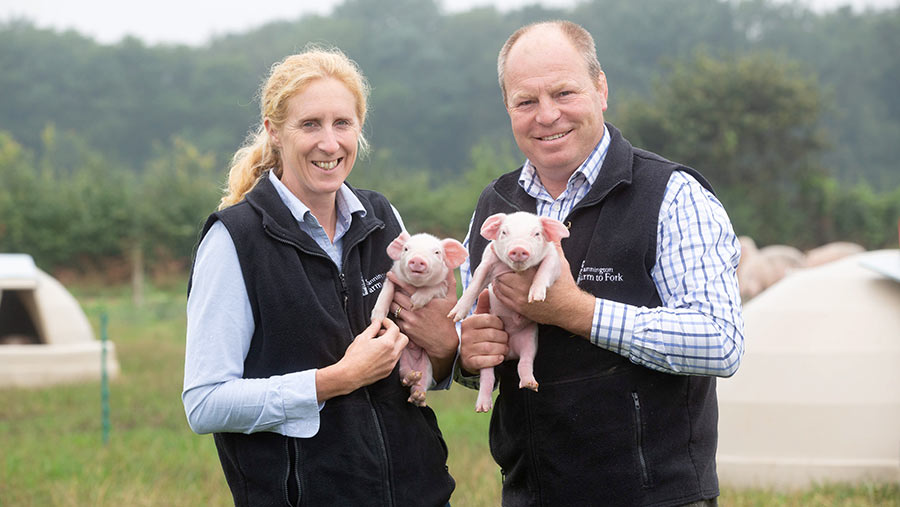
© Tim Scrivener
Farm facts:
- 700 outdoor Landroc sow breeding herd
- 13,000 pigs finished annually for Waitrose via Tulip
- 30 pigs a week supplied locally
What is the greatest challenge your business faces currently? And how are you planning on overcoming this?
We find that autumn/winter presents recurring disease challenges as there tends to be greater variation between day- and night-time temperatures, wind and foggy days.
We are working to improve the ventilation in the pig finishing sheds, minimising draughts and ensuring all temperature sensors are working correctly.
If you were head of AHDB what would you do with levy payers’ money?
I would like to see levy payers’ money spent more efficiently at transferring research and practical data to the producers.
For example, we have been trialling electronic ear tags and readers for several years. It would have been helpful to have access to other pig farmers’ experiences of electronic tags. AHDB needs to help facilitate this information sharing.
What three things are you nervous about this year?
1. Brexit and where are future trade markets are going to be
2. The threat of African Swine Fever entering Great Britain
3. The increasing disconnect between the public and farming, with the rise of veganism and animal rights activists having minimal understanding of the industry.
What excites you about 2019?
Hopefully we will build our own pig finishing shed from scratch.
What’s the biggest thing you’ve learnt from speaking to/visiting other farmers in the UK or abroad?
There are always different ways of doing the same job and it’s often the accumulation of multiple small changes that make a significant difference. I love visiting other pig farms to see how they do things, sadly this is a rarity due to biosecurity.
What advice would you give to your 18-year-old self?
Not to take as many exams; I’m a vet and it seemed a good idea to take further veterinary exams, I should probably travelled more before children arrived.
What do you think the opportunities are for your sector?
Innovation; we must embrace new technologies.
Our electronic ear tags have vastly reduced the paper trail and means we can link up all the finisher farms.
What’s your biggest bugbear about your peers/industry?
I feel lower welfare standards are tolerated when they should not be.
What was your last farming mistake?
We had a young guy who arrived with no previous pig experience.
We trained him on farm and he was naturally a good stockman but I failed to realise that after a year he needed a fresh challenge.
If we had rearranged our current stockmen I feel he would have relished a new role and stayed with us.
What do you think your sector needs to do to improve consumer perceptions?
We need to be more open about our farming practices and proud of our welfare standards.
What are the top three things on your farm to-do list?
1. Implement complete computerisation of all pig recording on to Smartpig from our finishing farms; all feed deliveries, pig movements and medicine records would automatically link into the main program.
2. Improve our gilt management, weighing gilts at certain stage, analysing the damline data and performance.
3. Stop sitting on the fence regarding water treatment systems, especially after seeing a brilliant water system on a poultry farm.
How are you feeling about Brexit?
Optimistic. I feel that efficiently managed farms with a focus on health and welfare will have opportunities to progress and be profitable.
James Tomlinson, Dairy Farmer of the Year 2018, Bilsborrow Hall Farm, Preston, Lancashire
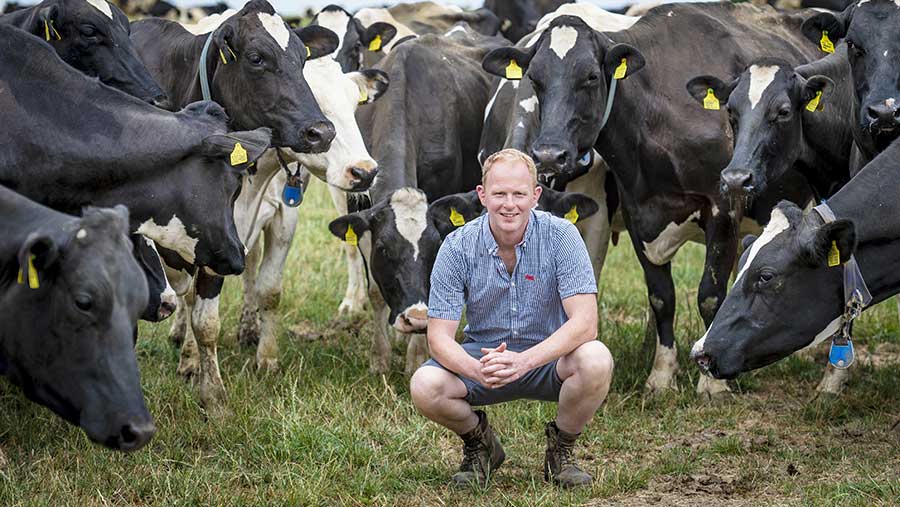
© Jim Varney
Farm facts:
- 160ha over two units
- Milking 270 Holsteins
- Calving year-round
What is the greatest challenge your business faces currently? And how are you planning on overcoming this?
Labour, climate change and Brexit, but I would say labour would be the greatest. As an industry we need to come up with a collective solution through desirable recruitment schemes, colleges and apprenticeships.
If you were head of AHDB what would you do with levy payers’ money?
I would research why agricultural colleges are not providing the sector with trained labour and devise new courses to achieve this. With flexible working hours, rewarding work and excellent rates of pay there should be no shortage.
What three things are you nervous about this year?
Brexit and the unknowns surrounding this, volatility in milk prices and the ever-changing climate.
What advice would you give to your 18-year-old self?
First, take every opportunity whilst you have the time and enjoy having £20 in your wallet. Once you acquire a wife and a family you will have neither of these.
Second, before you get totally involved in the family business, have a succession-planning meeting with all family members so everyone is on the same page or at least in the same book.
What do you think the opportunities are for your sector?
Technology; from genomics on the breeding side to robotics on the manual front.
If you could go and work in another country where would you go and why?
Australia. I spent a year there after finishing university and could go back tomorrow. The people are so friendly and laid-back, it’s just a great place to be.
What’s your biggest bugbear about your peers/industry?
There are not enough new entrants coming into the industry. Any industry needs fresh thinking and new ideas; ours desperately lacks both.
I wish share farming would work like it has in other countries, but with land prices staying so high it is rarely going to happen.
What was your last farming mistake?
Leaving the whole crop oats 24hrs too long in 26C heat. The forager hasn’t processed the heads of the crop and it is passing through the cows.
What do you think your sector needs to do to improve consumer perceptions?
We need to promote our high standards of production from hygiene to animal welfare to reduction in antibiotic use to a wider audience. We really have an industry we should all be proud of, we need to shout about it more.
If you won £1m on the lottery how would you spend it?
I have my life plan and I’m well on the way. A lottery win would almost feel like cheating. I want to sit in my chair when I’m 70 (hopefully) with a glass of red wine, a cigar and an immense sense of achievement.
What are the top three things on your farm to-do list?
LED lighting for the main cow building, a new milking parlour and extra slurry storage facilities in that order.
What might have changed on your farm by the end of 2019?
Hopefully the lighting in q13 and more beef calves as we increase the use of sexed semen and subsequently beef semen to limit the number of Holstein bull calves produced.
How are you feeling about Brexit?
Extremely worried. I think everyone underestimated the complexity of withdrawing from the EU, especially the issues it raises with the Irish border. If it was up to me there would be a second referendum offering two choices, accept the withdrawal deal (whatever this may be) or remain in the EU now that everyone is fully aware of the consequences.
Andrew Laughton, Beef Farmer of the Year 2018, Southfield Farm, Louth, Lincolnshire
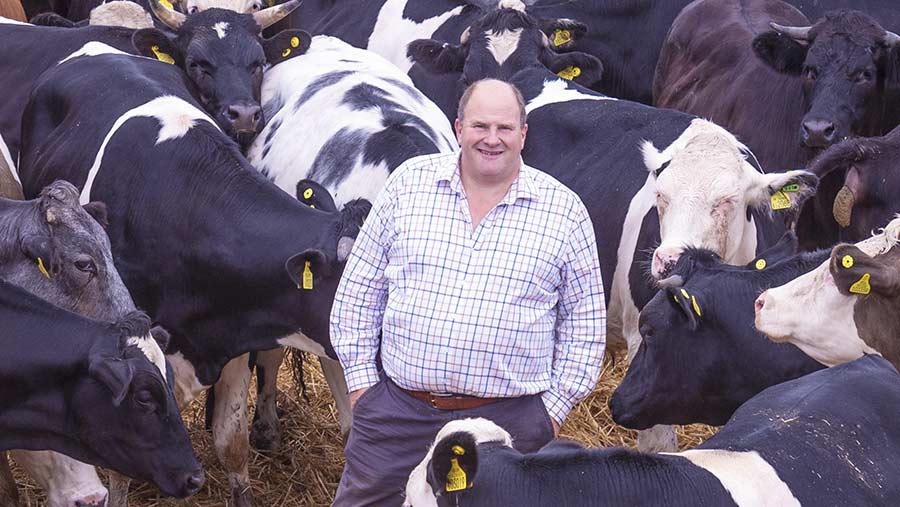
© Jim Varney
Farm facts:
- Finishes 6,000 cattle annually
- 50.5ha
- Supplies cattle deadweight on contract
What is the greatest challenge your business faces currently? And how are you planning on overcoming this?
Negative public perception and misinformation about livestock production and welfare.
We need to listen to consumers, hear what they want from us and gently tell them what we can provide for them – some of the safest, most traceable food in the world.
What are you most nervous about this year?
Defra’s clean air policy which could see us covering manure heaps in the future.
Any perceived benefits of doing this are in my opinion outweighed by practical setbacks and costs.
What excites you about 2019?
How technology is changing and how beef farmers can use technology to improve taste and tenderness, genetics and everything in between.
What’s the biggest thing you’ve learnt from speaking to/visiting other farmers in the UK or abroad?
Farmers need time to think outside the box. Their heads are full of the usual day-to-day farming jobs.
What advice would you give to your 18-year-old self?
Believe in yourself, listen, learn, think and go for it.
What do you think the opportunities are for your sector?
Efficiency – improving genetics, liveweight gain and feed efficiency.
We also need to improve the consistency of beef’s taste and tenderness. Market research shows there is a 12-week desertion period after a consumer has a tough steak and we need to do something about that.
What’s your biggest bugbear about your peers/industry?
Not enough of us listen to the consumer and act on it. That said, I admire other beef farmers for their commitment and hard work they put into their stock.
What was your last farming mistake?
Baling so much straw this summer. We got stuck in and now we have so much and supplies aren’t as tight as we thought they would be so selling it may be difficult.
How are you feeling about Brexit?
Just get on with it. There will be opportunities within Brexit – let’s find them.
